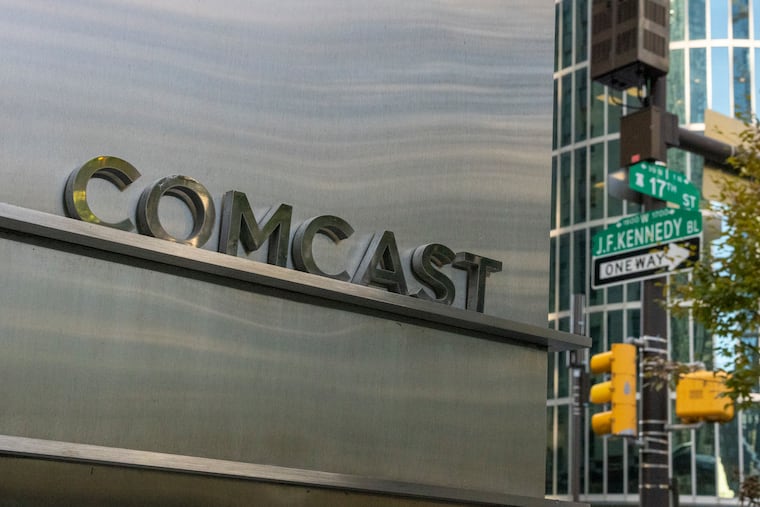Comcast lost internet customers for the first time. Executives call it a blip, but the stock is down sharply.
Comcast Corp. lost 10,000 residential internet customers between March and June, its first high-speed broadband loss ever.

Brian Roberts at Comcast Corp. sealed a deal with Microsoft Corp. mogul Bill Gates in 1997 for $1 billion to modernize Comcast’s cable network for the internet, leading Comcast to sell high-speed broadband to tens of millions of homes, apartments and businesses over the next 25 years.
Quarter after quarter, Comcast added hundreds of thousands of broadband customers — and those high broadband numbers were celebrated with a higher company stock price.
Until last week, when Comcast reported its first quarterly broadband loss ever: It shedded 10,000 residential internet customers between March and June. And 30,000 more customers fell away in the first weeks of July. Comcast’s stock has dropped sharply — 13% — since it told Wall Street last Thursday.
Could the great broadband run — like cable-TV before it — be over?
Wall Street seems concerned. One Comcast analyst titled his report “white knuckles.”
Company executives say the customer loss is a fragment of its base and momentary. Stuck in homes because of COVID-19, people accelerated Comcast broadband subscriptions during the pandemic. Now there’s a lull.
Complicating matters, the company says, is that fewer people moved into new homes or apartments between March and June, which cut down on potential new internet customers.
New 5G competition from telecom companies with super-fast wireless cut into Comcast’s broadband business, too, the company said. Most of this competition has been in rural areas where the telecoms don’t have to contend with tall buildings blocking their wireless signal.
“At some point, you will reach saturation,” said Brad Adgate, a media consultant in the Boston area. “This is bound to happen at some time. There are a lot of other competitors out there. There will be a day of reckoning. We have seen this before with cable. Comcast has seen this before.”
Morgan Stanley analyst Benjamin Swinburne said the broadband declines were “a stark reminder that the U.S. broadband market is maturing and competitive.” Comcast is solidly profitable and Swinburne said the company still has “pricing power” for its internet services and a diversified portfolio of assets to help profit growth.
“Cable earnings reports aren’t supposed to be a thrill ride,” wrote Craig Moffett in his “White Knuckles” review of Comcast’s earnings. “Cable companies are, after all, relatively predictable companies, with stable subscription businesses and low volatility.”
Charter also loses customers
But there is a broader trend. The second-largest cable provider, Charter Communications Inc., reported on Friday losing 42,000 residential customers between March and June. Its stock dipped 2% between Thursday and Monday, though it had recovered that amount by Tuesday’s closing bell.
Overall, Charter’s stock has fallen about 47% from a high of $821.01 in September 2021 to $437.65 on Tuesday. Comcast shares have declined nearly 39% since a peak of $61.75 last September, closing on Tuesday at $37.68.
Both Comcast and Charter expanded their product offerings into mobile phones in recent years, saying they can save consumers money by bundling internet and mobile phones. Comcast added 317,000 mobile phone customers between March and June, for 4.6 million total mobile phone customers.
But even with wireless growth, Barclays analyst Kannan Venkateshwar argues, Comcast and Charter could still face broadband challenges, MarketWatch reported this week. Recent factors imply, Venkateshwar said, that Comcast and Charter “are likely past peak growth and the debate therefore boils down to the degree of downside to broadband net adds going forward.”
Room to grow, Comcast says
It’s a sea change if the broadband dents in customer numbers persist. Microsoft’s $1 billion, and tens of billions of additional investments by Comcast, helped the company beat traditional telecom companies with clunky copper-based wires to win broadband customers. For years, high-speed internet has helped fuel Comcast’s profits even as streaming services drained cable-TV customers out of its portfolio.
Comcast believes it isn’t over. Its network passes 60 million businesses and homes and it has signed only about 32 million to its internet services.
Roberts, chief executive officer and chairman, told analysts last Thursday that Comcast is winning new customers “but the slowdown in [house and apartment] moves has resulted in fewer of these jump balls. And this has had the largest impact on our gross [internet] connects.”
Roberts also commented on the new “fixed wireless” services from AT&T, Verizon and T-Mobile, also known as 5G. He said the wireless companies have a “temporary opportunity” to promote and sell their broadband but Comcast believes their successes will eventually run their course.
Mike Cavanagh, Comcast’s chief financial officer, said that churn — or the loss of existing broadband customers — is “near all-time lows.” But Comcast still lost about 30,000 internet customers in the first weeks of July, he said.
Over the last dozen years, Roberts has diversified Comcast into the entertainment and news businesses with the acquisition of NBCUniversal — which also runs theme parks and movie studios — and the European Sky internet and television business. “We have so many diversified businesses ... [with their] own game plan,” Roberts said on the call with analysts.